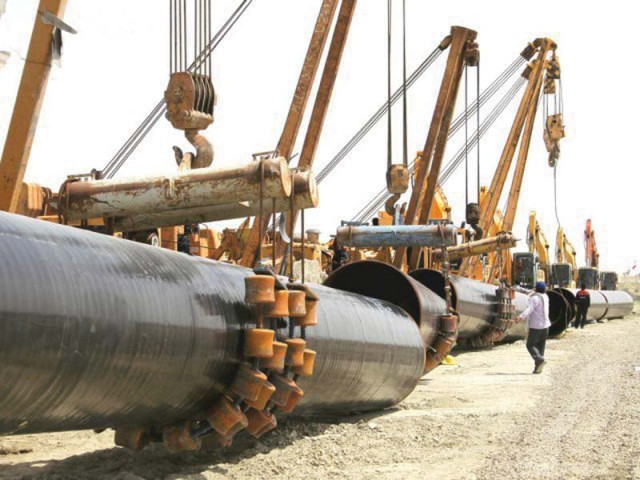Pakistani gas company set to emerge as key player on world energy map
TAPI pipeline to help meet Pakistan’s energy security plan, its financial close to be achieved by year-end

The existing infrastructure in Pakistan lacks the capacity to transport large volumes of gas from the southern to northern regions of the country. PHOTO: FILE
Pakistan is eyeing gas imports from countries holding vast deposits and has entered into some key agreements with Iran and Turkmenistan to meet its energy security plan.
Pakistan's $2 billion LNG pipeline project hits a snag
Iran holds the world’s second biggest natural gas reserves. In December 2012, its proven reserves stood at 1,187 trillion cubic feet as most of them have remained untapped because of international sanctions and delay in field development.
Turkmenistan, on the other hand, holds the world’s fourth largest natural gas reserves with proven deposits standing at 353.1 trillion cubic feet at the end of 2012.
“We have signed all agreements with these countries and financial close of the Tapi (Turkmenistan-Afghanistan-Pakistan-India) pipeline will be achieved by the end of this year,” ISGS Managing Director Mobin Saulat told The Express Tribune.
“Turkmenistan has huge gas deposits and this project will help meet the energy security plan of Pakistan.”
In an effort to bridge the gap between demand and supply of gas, the Pakistan government is pressing ahead with scores of projects including import of liquefied natural gas (LNG), Iran-Pakistan (IP) gas pipeline and Tapi gas pipeline.
Karachi to Lahore pipeline: Pakistan, Russia seal $2 billion energy deal
Domestically, the government has embarked on the much-needed infrastructure development by conceiving the North-South pipeline, which will transport gas from the country’s south to the north, and the Gwadar-Nawabshah pipeline. An LNG terminal has already been built which is another strategic project.
With the easing of sanctions on Iran, Pakistan has stepped up efforts to put the pipeline project on a fast track with high-level visits to and from Tehran. Now, both sides have shown their determination to take the project forward with mutual consensus and accord.
They have also agreed to make necessary amendments to the sale and purchase agreement and set a realistic timeframe for the project’s execution.
ISGS, which has been designated by the government, has continued to engage with relevant stakeholders in Iran and is working to restart the stalled negotiations.
Alternative project
Separately, the government has planned Gwadar-Nawabshah pipeline and LNG terminal, describing it as an ‘alternative strategy’ in relation to the IP pipeline. The Gwadar pipeline, which will be laid with Chinese assistance, will later be connected to the IP pipeline as it has the same route and technical specifications.
Pakistan awards $2 billion LNG pipeline contract to sanction-hit Russian firm
China Petroleum Pipeline Bureau, designated by the Chinese government, will implement the project along with provision of funds. From Pakistan, ISGS has been nominated to undertake work on the project.
Its first phase, expected to be completed by December 2017, will see transportation of up to 600 million cubic feet of re-gasified LNG per day, which will be enhanced to 1.5 billion cubic feet per day (bcfd) through additional compression by December 2018.
The project will act as a major catalyst to diversifying port utilisation and is strategic in nature. It has been put on a fast track as studies conducted for the IP project has been put to use. This has saved time and financial resources.
TAPI pipeline
Though beset by time lapses, inordinate delays, and financial and security challenges, the Tapi pipeline is still a major project that will supply 3.2 bcfd of gas to Afghanistan, Pakistan and India.
The decades-old project, lying dormant since the 1990s, received a fresh impetus in August 2015 with the endorsement of Turkmengaz, a state-owned company of Turkmenistan, as the consortium leader.
Since its groundbreaking in December 2015, work has been initiated on the pipeline and the feasibility study, design and route survey have been completed. A Pakistani proposal to develop a rail and road network from Turkmenistan has also been well received.
Obstacles
However, the existing infrastructure in Pakistan lacks the capacity to transport additional large volumes of gas from the southern to northern regions of the country.
Therefore, keeping in view the LNG supplies, the Ministry of Petroleum has planned to lay about 1,100km-long pipeline from Karachi to Lahore under the title North-South Gas Pipeline, which will carry 1.2 bcfd of gas.
This pipeline will be capable of adding Tapi gas at Multan in addition to the LNG supplied from the Karachi terminal. For this project too, ISGS has been nominated as the executing agency in association with a Russian company.
the writer is a staff correspondent
Published in The Express Tribune, August 15th, 2016.
Like Business on Facebook, follow @TribuneBiz on Twitter to stay informed and join in the conversation.



















COMMENTS
Comments are moderated and generally will be posted if they are on-topic and not abusive.
For more information, please see our Comments FAQ